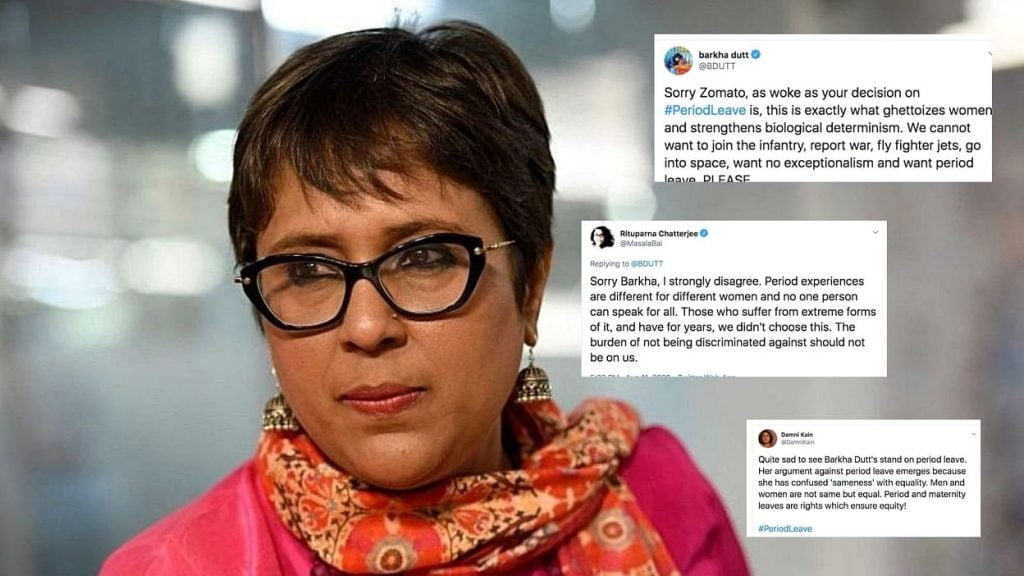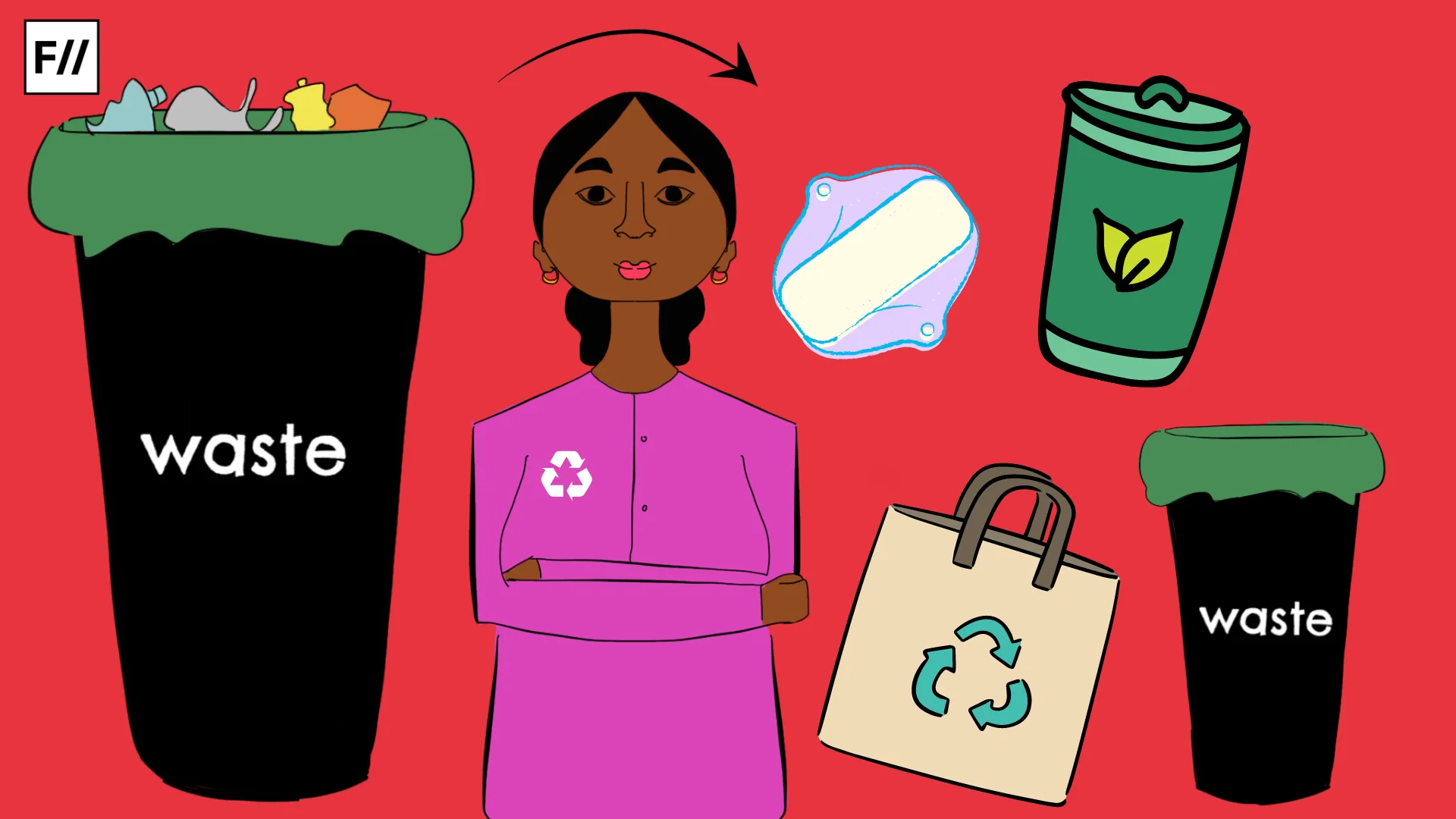With Zomato’s latest workplace policy that seeks to provide 10 days of period leave to menstruators annually, debates around the relevance and requirement of such a step have splintered into larger sociological underpinnings. The discussion pool currently harbours several conflicting ideologies and perspectives ranging from those that view this change in policy as disempowering for menstruators, and others who see it as an exercise of individual agency.

These perspectives are spewing across social media platforms in an attempt to dissect and analyse the repercussions of what the policy ought to bring. Barkha Dutt, in a Twitter post, expressed her disdain towards the inner workings of the policy and called it a “hideous” attempt at “gendering menstruators at the workplace”. If seen from the point of view of exacerbating gender based distinctions, her argument hits the bulls eye as it brings to light the problematic idea that a person’s biology determines their position and dependent responses to that in the workplace. However, it refuses to acknowledge the existence of choice and decision making in the context of individual agency.
The experience of your period is highly individualistic. What works for someone, might not work for the other. But knowing that a choice is available to you, in times of discomfort and pain, is far more empowering than being slathered with a uniform code that requires you to power through the pain and that is exactly what Zomato has attempted to do.
Dutt’s disbelief with respect to the period leave code, also skirts around the theory that propagates that natural processes such as menstruation need not be made into a big deal. This school of thought clings strongly to the idea that menstruation, much like fever, cold, cough (not in COVID times of course) diarrhea, flu etc., are normal life processes that don’t require monumental recognition, responses and mitigative methods. But what this fails to take into account, is that—is menstruation really as normalised as the humble (not so humble today) fever or stomach flu?
The answer is no.
The ridiculously patriarchal hushed hue and cry surrounding menstruation, places it on the opposite spectrum of normalisation. If the argument of it being a ‘natural, biological process’ is to be applied here, then why is it still sociologically stigmatised? Why are menstruators, all across India temporarily ostracised from the humdrum of everyday life? Why are spaces like temples, kitchens and the outdoors under siege for menstruators? Why are they branded as impure for those seven days?
If this is what normalisation looks like, then perhaps we have all been living a big fat lie. The idea of the period leave, seeks to normalise a natural biological occurrence like the periodic shedding of blood and attempts to place it in the same bracket as that of a regular cold & flu. If a certain amount of monumentalising is required to reach that level of normalisation, then I don’t see the harm in implementing such a change in policy.
Also read: Why Do We Need The Menstrual Leave Policy In India?
Barring the obstacle that sees menstruation as a taboo, there exists a plethora of sexist comments and jibes that hinder the normalisation process of menstruation. Workplaces might be self proclaimed hotbeds of inclusivity, equality and freedom of speech; however, the patriarchal structures within which workplace hierarchies operate, tell a different story. If and when, menstruators have spoken about the struggles of period discomfort, cramps, backaches etc. or have demanded a day off or some time off, they are often subjected to ill-treatment by fellow employees who refuse to take this time of “hormonal imbalance” seriously.

Many times when menstruators put forward their opinions or express disagreement at work, they are often referred to as “raging hormonal bitches” who don’t have control over themselves because it’s “that time of the month”. Talking about menstruation, makes a large chunk of the upholders of the patriarchal discourse either uncomfortable or transforms them into insensitive allies of sexism. This isn’t an attempt at generalisation, however, it is common knowledge that workplace responses to menstruation are often divorced from normalisation. Perhaps, this normalisation, will make people a bit more empathetic to the monthly biological struggles of all those who menstruate.
While I acknowledge the opinion on the exacerbation of the hue and cry around how having a period leave might actually end up being counterintuitive for those who menstruate, as it may lead to career oriented setbacks for them, I cannot help but endorse the fact that this perspective completely disregards the idea of individual agency. The whole idea behind the period leave, is that of choice.
Interestingly however, the one major flaw that Zomato’s policy consists of is that it has failed to take into account the fact that menstruators menstruate all throughout the year, i.e. for 12 months. The policy only accounts for 10 days of leave (considering one leave per month). So what happens in the last two months?
For some menstruators, working through the period days is a breeze, some might want to power through despite being in pain, but for many others like me, it is a time that is crippling—physically, mentally and emotionally where it becomes almost impossible to get out of bed to do even the most basic of tasks. The excruciating pain begins to mirror the tugging of ironclad hooks lodged into my uterus. Additionally, there are also people, struggling with PCOS and endometriosis for whom the pain and discomfort are amplified beyond measure.
At the end of the day, valid points have been made by all schools of thought, however, the importance and existence of individual choice and agency cannot be taken for granted. The experience of your period is highly individualistic. What works for someone, might not work for the other. But knowing that a choice is available to you, in times of discomfort and pain, is far more empowering than being slathered with a uniform code that requires you to power through the pain and that is exactly what Zomato has attempted to do.
Also read: Let’s Talk About Period Leave For Dalit And Tribal Women
Interestingly however, the one major flaw that Zomato’s policy consists of is that it has failed to take into account the fact that menstruators menstruate all throughout the year, i.e. for 12 months. The policy only accounts for 10 days of leave (considering one leave per month).
So what happens in the last two months?
Do menstruators stop bleeding for those two months because Zomato made an error in a seemingly progressive policy?
About the author(s)
Janhavi Sharma is a gender, history and food enthusiast and recently graduated from the Young India Fellowship at Ashoka University. She wants to study Gender and Sexuality for her master’s and wants to travel to Azerbaijan. She is an ardent feminist and aims to make a difference within the discourse of academia.



